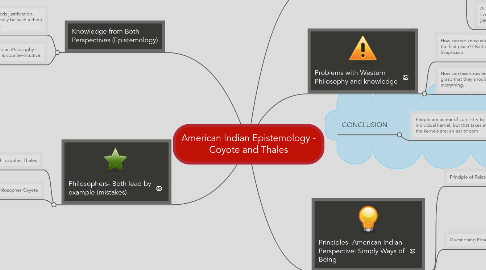
1. Knowledge from Both Perspectives (Epistemology)
1.1. Western Philosophy - Needs justification, so-called knowledge to really be such a thing must rest of a foundation.
1.1.1. Truth and Knowledge ends in themselves, shape our actions.
1.2. American Indian Philosophy - Justification is counter-intuitive.
1.2.1. Knowledge is gained through experience, it is what we put to use.
1.2.1.1. Knowledge is not a thing in the world to be discovered. Shaped and guided by our actions.
1.2.1.1.1. We only know what we need to know. In front of us, at our feet.
2. Philosophers- Both lead by example (mistakes)
2.1. Greek Philosopher Thales
2.1.1. Falls into a well cause he's more concerned with the stars that what's at his feet.
2.2. American Indian Philosopher Coyote
2.2.1. Causes a flood because of his own desires, wrong way to act!
3. American Indian Philosophy on Knowledge
3.1. Knowledge is not limited since we have as much as we should.
3.1.1. Goal 1
3.1.2. Goal 2
3.2. Knowledge is knowledge in experience.
3.2.1. Gained from experience - Example = Learning music by ear.
3.3. We carry knowledge with us.
3.4. Allows us to function in the world, live our lives = embodied knowledge. Needs no justification.
4. Problems with Western Philosophy and knowledge
4.1. How can we know what is right in the first place?? Battle of Skepticism.
4.2. How can less knowledge be better? Cannot grasp that they shouldn't or can't know everything.
5. Principles- American Indian Perspective: Simply Ways of Being
5.1. Principle of Relatedness
5.1.1. "We must never forget the things around us and how we are related to those things" (Burkhart, p.16).
5.1.2. The most important things are the simple things directly around us.
5.2. Questioning Principle
5.2.1. Coyote says: Questions we choose t
5.2.1.1. ask are more important than any truths we may hope to discover.
5.2.1.1.1. How we act impacts the way the world is.
5.2.1.2. American Indian- Questions are signs of confusion or misunderstanding. More knowledge is not always better, some things are not meant to be known.
5.3. Principle of Action
5.3.1. Meaning-Shaping
5.3.1.1. How we behave shapes meaning and gives shape to the world.
5.3.1.1.1. How we act is important as any truth or fact.
5.4. Moral Universe Principle
5.4.1. The universe is moral.
5.4.1.1. Facts, truth, meaning, our own existence all relate.
5.4.1.1.1. What is the right road for humans to walk?? MORAL INVESTIGATION
6. CONCLUSION
6.1. People are an ear of corn - try to think of each individual kernel, but that takes away from what the kernels are; an ear of corn.
6.1.1. Life and Knowledge are not permanent. Don't forget your relations, your elders, or who you are.
